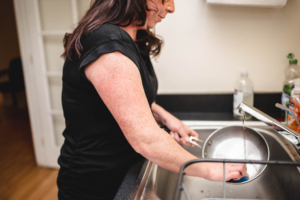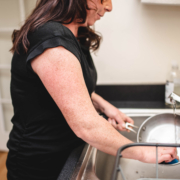Independent Living: The Path to Self-Reliance
 One of the main objectives of the Colorado Recovery program is for patients to achieve a certain degree of social independence.
One of the main objectives of the Colorado Recovery program is for patients to achieve a certain degree of social independence.
Our recovery model is a holistic, patient-centered approach to mental healthcare. This model is based on the simple premise that it is possible to recover from a mental health condition. Not that long ago, schizophrenia, bipolar disorder, and similar severe mental health conditions were considered chronic and beyond the reach of any meaningful recovery.
PROVIDING SUPPORT AND ENCOURAGEMENT
The recovery model counteracts feelings of disempowerment and worthlessness in the patient. Its key tenets—“optimism about recovery from schizophrenia, the importance of access to employment, and the value of empowerment of user/consumers in the recovery process—are supported by scientific research,” wrote the late Colorado Recovery founder Richard Warner in 2009. “Attempts to reduce the internalized stigma of mental illness should enhance the recovery process.”
Indeed, stereotypes, discrimination, and internalized stigma can be big problems for people with schizophrenia, bipolar disorder, and similar conditions. Stigma tends to discourage our clients, preventing them from going out in the world and trying new things. Even food shopping or going out on a walk can appear daunting.
“On their own, many would not even go for a walk,” says Peter Kamback MFA, a vocational rehabilitation specialist and community organizer for Colorado Recovery. “With me there, I encourage them to go out and take these small steps on social interactions with people in the community. Even just a greeting look at a passerby becomes less intimidating with me around. If they see me saying ‘Hello’ to a stranger, they become more comfortable with it.”
Social support outside a therapy group setting can definitely improve recovery outcomes. “Going to the store, walking around in a public space, just having someone there to support them can go a long way,” says Kamback. “If they see that the person next to them can do it, they start thinking, ‘I can do it, too.’ Colorado Recovery specializes in that kind of support.”
Getting clients to vocalize their goals can be difficult, so just being there for them and offering support is crucial. “Getting to a point where they feel they can have a normal conversation and just be themselves is really important,” says Kamback. “Then, they can try to delve more deeply into what we can help them with, what their interests and goals are.”
The healing power of connection can not be overstated. “You establish a rapport with a client and all of a sudden they are willing to come out of their apartment,” says clinical therapist Julie Owen, MA, LPC. “This kind of accepting, non-judgmental relationship often makes them try something they haven’t been willing to try before. Because of the relationships we have here with our clients, we can take them to a museum or bowling—even go-karts.”
SOCIAL RECOVERY
“Social recovery includes the components of interdependence with others, connectedness, recovery capital, and social capital, as well as the impact of collective culture and the structural elements of our socio-economic-political system,” wrote Professor of Social Inclusion and Wellbeing Shulamit Ramon in 2018. “To add to the complexity, the impact of each element on one’s identity, in interaction with how one is seen by others, needs to be taken into account.”
Professor Ramon points out that social recovery was initially described by Dr. Warner in his book Recovery from Schizophrenia as economic and residential independence with low social disruption but has since been expanded to refer to people’s ability to lead meaningful and contributing lives as active citizens.
According to Warner, acceptance of mental illness (insight) with an internal locus of control can lead to empowerment and good outcomes while acceptance of mental illness with an external locus of control (internalized stigma, controlled by others) leads to poor outcomes.
Beginning with a careful assessment, the team at Colorado Recovery evaluates what level of support is needed to create an environment of success for our clients. “Our patients are some of the most courageous human beings I have ever seen,” says Owen.
At Colorado Recovery, it is our mission to help adults with serious mental health issues stabilize their illness, minimize symptoms, improve functioning, and enhance each person’s social inclusion, quality of life, and sense of meaning in life. Clients continue to be connected clinically while in the independent living program which allows them to benefit from our dynamic levels of care and receive the best possible support.
If you have questions about our services to treat schizophrenia, bipolar disorder, and similar mental illnesses, call us at 720-218-4068 to discuss treatment options for you or the person you would like to help.





